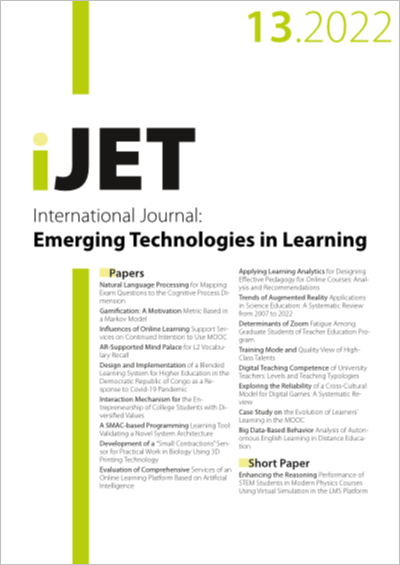AR-Supported Mind Palace for L2 Vocabulary Recall
DOI:
https://doi.org/10.3991/ijet.v17i13.25073Keywords:
augmented reality, mnemonics, visuospatial bootstrapping, second-language learning, vocabulary retentionAbstract
MnemoRoom4U is an AR (Augmented Reality) tool that uses a memory-palace strategy for foreign-language training. A memory palace helps information recall with the aid of object association in visualizations of familiar spatial surroundings. In MnemoRoom4U, paper or digital flashcards are re-placed with virtual notes containing L1 words and their L2 translations that are placed on top of real physical objects inside a familiar environment, such as one’s room, home, office space, etc. The AR-supported notes aid associative memory by establishing a relationship between the physical objects in the user’s mind and the virtual lexis to be retained in L2. Learners first set up a path through their familiar environment, attaching virtual sticky notes—each containing a target word to be memorized together with its corresponding source-language translation—to real-life objects (e.g. furniture in their homes or offices). They then take the same path again, reviewing all the words, and finally carry out a retention test. MnemoRoom4U is a technological artifact designed for specific didactic purposes in the Unity game engine with the ARCore augmented-reality plug-in for Android. This work takes a Design-Science approach with phenomenological, exploratory underpinnings tracking back to the efficiency of spatial mnemonics previously reported quantitatively and combines it with AR technology to effect L2 vocabulary recall.
Downloads
Published
2022-07-11
How to Cite
Larchen Costuchen, A., Font Fernández, J. M., & Stavroulakis, M. (2022). AR-Supported Mind Palace for L2 Vocabulary Recall. International Journal of Emerging Technologies in Learning (iJET), 17(13), pp. 47–63. https://doi.org/10.3991/ijet.v17i13.25073
Issue
Section
Papers
License
Copyright (c) 2022 Alexia Larchen Costuchen, José María Font Fernández, Minos Stavroukalis

This work is licensed under a Creative Commons Attribution 4.0 International License.



